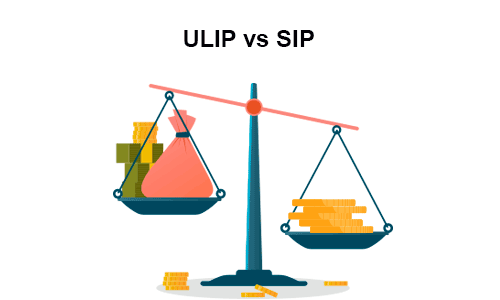SIP or Lumpsum Investment – What to Choose?
Mutual funds investors often get confused about how to invest their money in these funds to get higher returns on the investment. There are two options to put your money in mutual funds, either via a systematic investment plan (SIP) or lumpsum investment (one-time investment). Financial experts tend to prefer SIP over lumpsum as it solves the three major challenges faced by new investors, which are –
- Not possessing sufficient investible funds
- Apprehensiveness about the volatile stock market
- Lack of discipline regarding savings
However, a few investors also opt for lumpsum investment based on their financial condition. To get better clarity over which investment method is better – SIP or lumpsum investment, let’s go through this article and gain in-depth insights into what exactly are lumpsum investment and SIPs, and what is the difference between the two. Once a clear distinction is drawn, you will be able to make a smart investment decision.
Table of Content
What is Lumpsum Investment?
Lumpsum investment implies investing the entire amount in mutual funds in one go. Often a preferred choice of seasoned investors, lumpsum investment is an appropriate option for investing assets that offer greater returns on investments in the long run.
Features and Benefits of Lumpsum Investment
Here are the major features and benefits of lumpsum investment in mutual funds –
- Free from Committing to a Single Venture – When you opt for lumpsum investments you won't have to commit to put money in just one venture. It is a preferred investment mode for investors who lack a fixed income.
- Convenience – Lumpsum investment does not require the investors to set apart a portion of their income for periodic investment in mutual funds. This makes the investment mode more convenient, as there is no need of planning finances each month so as to have a set amount for SIPs.
What is Systematic Investment Plan (SIP)?
SIP is an investment method for mutual funds done regularly in a systematic and planned manner. It is somewhat similar to a recurring deposit bank account. The primary difference between the two, however, is that your funds are invested in a mutual funds program rather than in a bank deposit.
SIPs cultivate a regular savings habit among investors and encourage a disciplined method of investment. Under an SIP, a fixed amount is automatically taken from the investor’s account and invested in a mutual fund scheme for a predetermined term on a monthly or quarterly basis.
Features and Benefits of SIP
The following are the key features and benefits of SIPs –
- Enables Easy Management of Volatile Market – SIPs enable you to regularly invest in a mutual fund, allowing you to stay invested for a longer duration. This, in turn, can help you even out the impact of volatile market and make gains in the long term even considering the volatility of the market.
- Uses the Power of Compounding – SIPs enable you to develop the habit of investing regularly. Moreover, when you invest regularly over a long time, you can compound your investments. SIPs compound the funds in a more comprehensive and systematic manner.
- Helps in Achieving Financial Objectives – You can easily achieve your financial goals of getting a dream home, going on a vacation, or saving for your child’s higher studies in a systematic manner with the help of SIPs, as they facilitate long-term wealth creation for meeting these objectives.
Difference between SIP and Lumpsum Investment
Tabled below are the fundamental points of difference between Lumpsum investments and SIPs with respect to mutual funds –
| Basis | SIP | Lumpsum Investment |
|---|---|---|
| Need to Monitor the Market | Investors don’t not need to keep an eye on the market performance regularly as the money is spread across different ventures | Investors need to keep a tab on how the market is performing as they have made investment in one shot for a long term – there is a risk of losing a large portion of money in case the market crashes |
| Response to Volatility | SIPs generally remain unaffected by market volatility | Lumpsum investment is highly responsive to changes in the market |
| Flexibility | Compared to lumpsum investment, SIPs are more flexible investment method | Lumpsum investments are more rigid |
| Induces Financial Discipline | Habit of investing regularly inculcated in a planned manner | No financial discipline cultivated as the money is invested in one go |
Benefits of Lumpsum Investment over SIP
Some of the advantages of lumpsum investment over SIP are discussed in detail below –
- Convenient to Investment Method – Under lumpsum investment, you invest your money just once and can watch the money growing. With SIPs, on the other hand, you need to invest a portion of your income regularly.
- Capital Appreciation – The money invested in lumpsum appreciates in the long run and can be adjusted as per the changes in the market.
- Minimum Charges – Since you invest only invest once under lumpsum investment, you incur bare minimum charges when compared with SIPs. The transaction as well as maintenance costs are low for lumpsum investment, which can enable you to invest a large amount in one go.
Benefits of SIP over Lumpsum Investment
The following are the benefits of SIPs over lumpsum investment that will help you choose SIP or lumpsum investments –
- No Requirement to Constantly Monitor the Market Performance – If you are a beginner in the field of investment, investing a lumpsum amount right away in mutual funds could be risky. It is so because if the market crashes, you will end up losing the entire amount. When you invest in SIP, however, your funds are uniformly spread across different commodities. So even if the market becomes volatile, only some portion of the entire investment will be affected. Consequently, you won’t be under the stress of regularly monitoring the market to gauge your investment value.
- Inculcates the Habit of Investing – SIPs require you to keep a certain sum of money aside for investment periodically, thus helping you to develop financial discipline.
- Suitable for Beginners – SIP investment is ideal for people who have just begun working – they can be considered as the stepping stones to initiate investing. To gain market experience, it is crucial to invest a nominal amount slowly but steadily. Once you have understood how the financial market works, you can invest in riskier commodities as per your requirements and risk appetite.
- Better Performance – SIP investments help individuals earn a higher return on investment in the long run compared to lumpsum investments.
SIP or Lumpsum Investment - Which is a Smart Investment?
Having understood what SIP and lumpsum investment methods are and their differences, it is now important to dwell on what is a smarter investment option – SIP or lumpsum investment.
The following points will help you make a wise decision –
- Investing money either via SIP or lumpsum investment has its own set of benefits and risks. The decision primarily depends on your level of financial experience, appetite for risk, and types of funds you want to invest in.
- If the purpose of investing is learning about the financial market, SIP offers a broader perspective on the same. You can invest a nominal amount and see the money multiply with the power of compounding.
- Your investment choice will also depend on your financial objectives. For instance, if you wish to purchase a new home, you can do so with regular SIPs, as they can enable you to earn a higher return on investments in the long run.
Key Takeaways
- Financial experts usually prefer SIP over lumpsum as it solves the three major challenges new investors face – not possessing sufficient investible funds, concerns about the volatile stock market, and lack of discipline regarding savings.
- Lumpsum investment means investing the entire amount in the mutual funds in one go. Often a preferred choice of bigger market players, lumpsum investment is an appropriate option for investing assets that offer greater returns on investments in the long run.
- SIP is an investment method for mutual funds that facilitates investment in a systematic and planned manner. Considered somewhat similar to a recurring deposit bank account, an SIP can develop regular savings habits in investors and encourages a disciplined method of investment.
- Before choosing whether to invest using SIP or lumpsum investment, it is necessary to study the benefits offered by the two investment options.
- Under lumpsum investment, you invest your money just once. This is unlike SIPs, where you need to invest a portion of your income regularly.
- If you are a beginner in the field of investment, investing a lumpsum amount right away in mutual funds could be risky. If the market crashes, you can end up losing the entire amount. When you invest in SIP, your funds are uniformly spread across different commodities. So even if the market becomes volatile, only some portion of the entire investment will be affected.
- SIP investment is ideal for people who have just started working recently. They can help new investors and earners enter the realm of investing. To gain marketing experience, you can invest a nominal amount steadily. One you understand how the financial market works, you can invest in riskier commodities as per your requirements and risk appetite.
Policybazaar UAE – Helping you navigate the wilderness of the insurance world!

More From Investment
- Recents Articles
- Popular Articles













.jpg)











.jpg)
.jpg)









